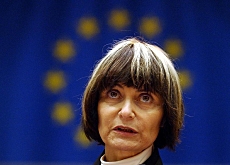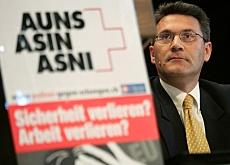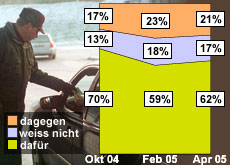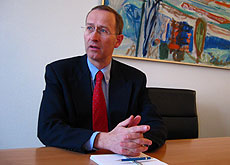“Opponents of Schengen are spreading fear”

The Swiss foreign minister has accused opponents of security and asylum treaties with the European Union of trying to "spread fear" ahead of a nationwide ballot.
But in an interview with swissinfo, Micheline Calmy-Rey said she was confident of winning support for the Schengen/Dublin accords when they are put to a vote on June 5.
Schengen/Dublin governs closer cooperation with the EU on crime and asylum. The treaties form part of a second set of bilateral accords signed between Bern and Brussels in 2004.
A separate vote on whether Switzerland should extend an existing accord on the free movement of people to include citizens from the ten new EU member states is scheduled for September.
The ballots are being held after opponents of the accords, led by the rightwing Swiss People’s Party and the isolationist Campaign for an Independent and Neutral Switzerland, collected enough signatures to give voters the final say on both issues.
Latest opinion polls suggest that the electorate will support Schengen/Dublin by a comfortable majority.
But Calmy-Rey is leaving nothing to chance: she has spent the past few weeks travelling across the country in an effort to convince wavering voters of the advantages of closer cooperation with Brussels.
swissinfo: Let’s start with the worst-case scenario. What happens to Switzerland’s relationship with the EU if voters reject the Schengen/Dublin accords on June 5?
Micheline Calmy-Rey: Schengen/Dublin is in the interests of Switzerland and the treaties are good news for our economy and security… so the only thing that will happen [if the treaties are rejected] is that we will have damaged our own interests.
That would be a great pity because it’s worth remembering that it was Switzerland that wanted to negotiate joining Schengen/Dublin – there was no pressure from the EU to do so.
Certain opponents of Schengen are trying to spread fear and frankly are just making facts up. That’s why I’m investing so much time trying to inform people about the truth so that voters know what is at stake. I think the Swiss are pragmatic and know where their interests lie.
swissinfo: You’ve been travelling around the country on a marathon campaign in favour of ‘yes’ votes in June and September. Would you consider resigning if the votes go the other way?
M.C-R.: No. I live in a country which has direct democracy as its cornerstone. The Swiss government works within this system of democracy, so a ‘no’ vote would not mean that I have to resign. It would just mean a return to the drawing board.
swissinfo: Supporters of closer ties with Brussels argue that rejection of the latest set of accords would leave Switzerland isolated in the centre of Europe. Is that a fair assessment?
M.C-R.: All I can do is hope that this does not turn out to be the case! Switzerland has been able to play a number of trump cards and has managed to conclude a series of practical accords which allow for cooperation with its European neighbours. I have confidence in the good judgement of the Swiss people and believe that they will support the bilateral route.
swissinfo: If the two votes this year go the way you want them to, would this pave the way towards EU membership talks?
M.C-R.: The bilateral approach we have taken leaves open all options in terms of the future of Swiss-EU ties. What this means is that both opponents and supporters of Swiss membership of the EU can be happy with the [latest set of bilateral accords].
Whether Switzerland will be ready to join the EU one day is a matter for the Swiss people to decide. During the present legislative term the government will prepare a report on all relevant questions… important to the Swiss population before discussing EU membership.
swissinfo: You frequently extol the merits of Swiss neutrality when on trips abroad. But back home that same neutrality is used in some quarters to justify rejection of closer ties with the EU…
M.C-R.: Neutrality is important to the Swiss. It is part of our identity and helped in the defence and preservation of Switzerland during the First and Second World Wars. So it’s perfectly understandable that the Swiss should be very attached to neutrality.
That said, it’s true that some people understand or interpret neutrality as meaning we have to remain passive and say and do nothing. For them, the ideal foreign minister would be someone who never goes beyond the country’s four language regions!
But people who think along these lines have forgotten that the world has changed and that today we are confronted with issues such as civil conflict, natural disasters, epidemics and immigration. Solutions to these global problems can only be found through international cooperation.
[Those who hide behind neutrality] forget that Switzerland is not as small a country as they think and that we can have some influence on what goes on in the world in such a way that our interests are preserved. In other words, we will not become more prosperous or have more security by hiding behind a wall or turning down closer ties with Europe.
swissinfo-interview: Ramsey Zarifeh
The Schengen/Dublin accords form part of a package of bilateral treaties signed with the European Union in 2004.
Opponents of closer ties with the EU collected enough signatures to force a nationwide vote on Schengen/Dublin. This is due to be held on June 5.
Another vote, on whether an existing bilateral accord governing the free movement of people should be extended to include citizens from the ten new EU member states, will take place in September.

In compliance with the JTI standards
More: SWI swissinfo.ch certified by the Journalism Trust Initiative



You can find an overview of ongoing debates with our journalists here . Please join us!
If you want to start a conversation about a topic raised in this article or want to report factual errors, email us at english@swissinfo.ch.